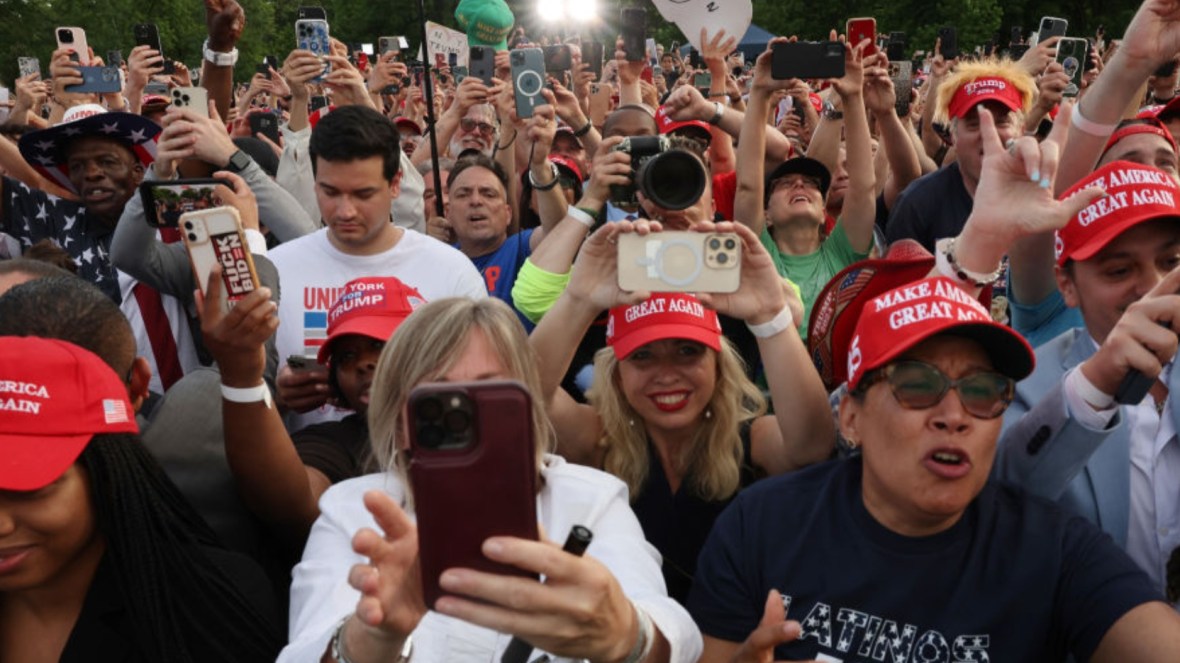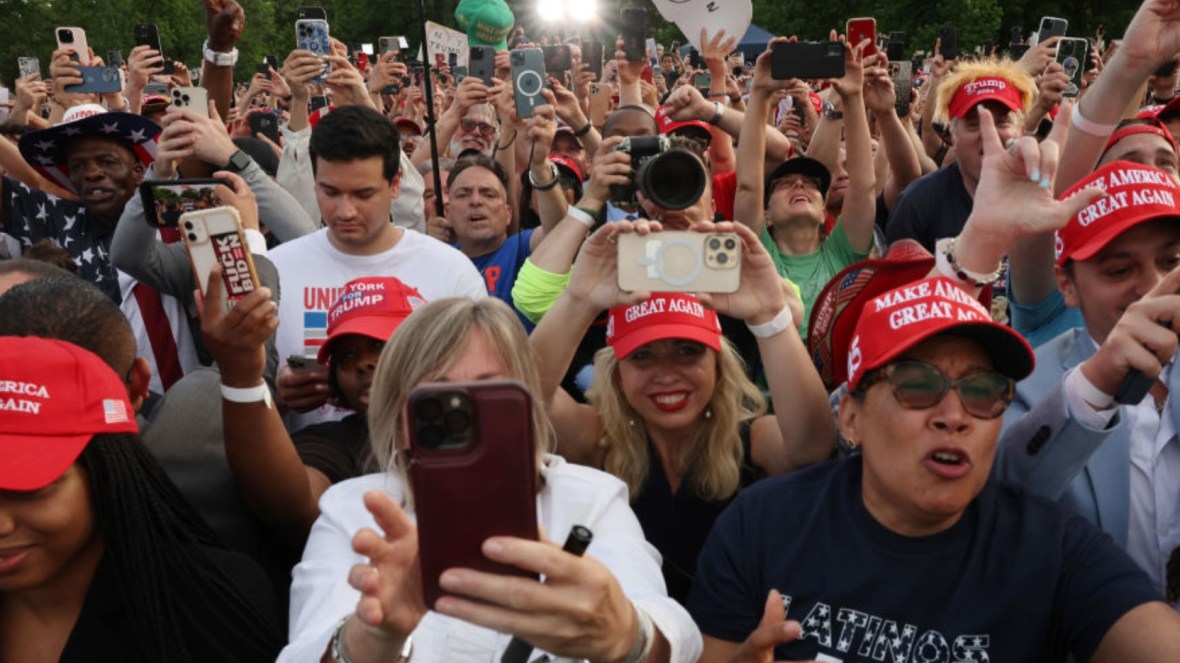What did Black Latinos think about those pro-Trump Latino exit polls?

In an election news cycle obsessed with identity, most media outlets overlooked the diversity of Latino voters, portraying them as a single racial group and overlooking Black Latinos in the process. But the “Latino vote” has always been a complex story.
When Josué Perea scrolled Instagram the night after the 2024 election, he saw a comment from a friend that stopped him in his tracks:
“Latinos, I’m never going to forget that y’all voted for this guy.”
The friend was African American and part of a larger community of Black voters who felt betrayed by exit poll numbers that revealed an increased number of “Latino” voters supported Donald Trump. While it wasn’t a majority (46% voted for Trump in 2024, up from 32% in 2020), the news of increased support shattered what many assumed to be a coalition of ethnic minorities who would lean left for Kamala Harris.
In this moment, Perea, who is Black racially and ethnically Latino (his family is from Colombia), was confronted squarely with the reality of his dual identities.
“My first reaction was I already understood where those numbers come from,” Perea told theGrio. “And those numbers don’t necessarily come directly from all aspects of the Latino community.”
Perea is one of many Afro-Latino leaders who watched in frustration as numerous media outlets reported exit polls that positioned all voters with Latin roots as a racial category of their own, apart from Black, white, and Asian voters.

It’s a practice that has been contested and challenged by many Afro-Latinos, who say that pollsters and new Census questions which count “Latino” as a race of people are muddling data, overlooking the racial differences amongst Latinos. Treating “Latino” as a racial category instead of an ethnic group lumps groups of people with origins in 20 different countries from the Dominican Republic to Mexico into one big group for reporting ease because of a shared Spanish language.
For Perea, the executive director of the Afro-Latin@ Forum, anyone who’d been paying attention to the unique populations in Latino communities would’ve understood why Trump’s racist rhetoric was not disqualifying for these voters.
“There’s a lot of support for the perspectives and the rhetoric that comes from the Trump campaign,” Perea told theGrio. “Every different Latino nationality [and] country situation has anti-Black sentiments embedded within the culture. In some places, it’s the inability to call someone ‘Black’ or the lack of desire to say that someone’s Black or to think the word ‘black’ means evil or the word ‘black’ means bad,” he explains.
Dr. Yomaira Figueroa, director of the Center for Puerto Rican Studies in New York City, similarly was not surprised by the historic increase in Latino voters who reportedly broke for Trump but was also critical of reporting that didn’t provide detail about how different Latino groups voted. The gender gap in Latino votes was another key part of the exit poll story, as 60% of Latina women voted for Kamala Harris, whereas 60% of Latino men voted for Donald Trump.
“I knew that there was kind of like a righteous rage around these numbers,” Dr. Figueroa told theGrio. “However, one of the things we understand from this data is that data on Latinos in general and Afro-Latinos, in particular, are not disaggregated, which means we actually have no real sense of the racial and class backgrounds of the folks who were being polled.“
“The lack of a real sense of who is voting becomes an important part of the story we have unraveled,” she continued. “For example, machismo, misogyny, patriarchy is really strong in the Latino community. We know that because, for example, in Puerto Rico and the Dominican Republic, there’s a state of emergency around questions of domestic violence and femicide. So if we’re thinking about that aspect of the culture, we can actually then see the correlation between, for example, ideas of patriarchy and male supremacy in the U.S. political arena, then appealing to folks who understand that as a way of being in the world.”
Voting Against Your Interests?
Donald Trump promised mass deportations on day one of his administration, which could affect nearly all Latin American immigrants, with the exception of Puerto Ricans who are U.S. citizens.
For the whopping 60% of Latino men who supported Trump, and even some pro-Trump Latina women who have justified their support, left-leaning commenters have expressed confusion over how it’s possible they could back a leader who, in all likelihood, could try to deport them or members of their family.
“They don’t see themselves as being the ones that are attacked,” Josué Perea told theGrio. He said pro-Trump Latino voters likely think, “‘You’re not talking about me. You’re talking about maybe the Black Latinos, for sure. You’re talking about the new migrants, which are the … more indigenous Latinos. You’re not talking about me because I’ve been here. I’m part of this culture.’”
When it came to messaging, Perea says the Trump campaign intentionally targeted Latinos through Spanish-language media, connecting with radio and TV hosts regularly. They also focused on reaching Spanish-language faith leaders early in the campaign cycle, a direct vehicle to influence the votes of faithful parishioners.
That strategy paid off and tapped into elements of socially conservative and traditional cultures in Latin America that didn’t shy away from but welcomed a strongman figure.

“Latino men overwhelmingly supporting a fascist strongman, iron fist authoritarian figure — they want to be him,” said Dash Harris, an Afro-Panamanian public historian and director of the docuseries NEGRO. Harris said she wasn’t surprised by the election results and didn’t buy into the idea that all Latinos are minorities.
“The jig has been up,” Harris told theGrio. “Black and Indigenous Latin Americans have been speaking about this for generations at this point.”
“What are the interests of Latinos? What Latinos are we talking about? What interests are we talking about? The idea that Latin Americans, just by virtue of being from Latin America, are of color and/or they are either raceless or ‘beige’ or ‘tan’ or ‘transcended race’ — all of these [are] myths around Latin America that have been manufactured and even perpetuated by Latin Americans themselves.
She added, “They want to be just like [Trump]. They like his politics, his policies, his isms, whatever that is. Racism, homophobia, transphobia, sexism, misogyny, or the list goes on.”
Harris, who also has a significant following on social media and teaches anti-racism and Latin American history courses, uses her platform to try to educate the public about similarities between racism in the continental U.S. and abroad in various Latin American countries like Panama, Venezuela and Argentina.
“These voting patterns, or what interests Latinos in the U.S., is mirrored in Latin America itself. These figures such as Trump … are all throughout the region. This idea of far right-ism, of hard-on-crime, whether it’s being favorable to oligarchs, to business owners, to exploiters. You have all of that throughout the region.”

Whatever Happened to “Black and brown”?
The U.S. has an estimated 6 million Afro-Latino or Black Latino adults living in the country, according to the Pew Research Center, but the numbers could be higher. Some of these adults do not identify as “Hispanic,” according to Pew, but would qualify as Latino. However, most portrayals of Latino voters don’t include Black Latinos or even acknowledge white Latinos who “pass” as Anglo-Americans. In America, most Latinos are perceived and portrayed as “brown” or mestizo — a mixed group of people who are both discriminated against and a growing ethnic majority.
Despite the mainstream cultural emphasis on celebrating “Black and brown” coalitions, Harris said until racism is confronted head-on, any distrust or disappointment from Black communities toward non-Black Latinos after the election may harden. Harris points to the Civil Rights Movement and the Black Lives Matter movement as examples where solidarity worked to benefit multiple ethnic groups, but didn’t necessarily result in eliminating anti-Blackness.
“We have to be honest about extractivism from Black spaces. We have to be honest about ‘brown’ people benefiting from Black power and not reciprocating or investing in Black power and or Black liberation … or we’re going to keep repeating the same patterns and pretending to be shocked,” said Harris.
For Dr. Yomaira Figueroa of CENTRO, as an Afro-Puerto Rican woman, the election exit polls should challenge institutions to tell more useful stories about Latino communities.

“Throwing all Latinos together is akin to saying, ‘North Americans would vote X or Y way.’ The U.S. media must dig deeper into the diversity and heterogeneity of the Latino experience,” Figueroa told theGrio.
Figueroa highlights that disaggregation of data even beyond race, analyzing other factors like nation of origin, class, geography, and generation, shows important differences between Latino groups. This is key for understanding populations like Puerto Ricans, for example, who overwhelmingly voted for Kamala Harris and are U.S. citizens with a complicated colonial relationship with the U.S.
On the other hand, Figueroa says that Cubans who’ve immigrated to the U.S. in areas like Florida are often white Latinos and, due to the Cold War and Castro regime, tend to lean Republican. This history may explain the 68% high of Cuban support that Trump received heading into the election.
“A lot of Cuban upper middle class and elite families left Cuba, came to Miami, established themselves with a lot of support, a lot of material resources from the U.S. government, material resources that in fact people in Florida that were African American and other races, were not able to access in the same ways that the Cuban population was,” Figueroa told theGrio.
Josué Perea of the Afro-Latin@ Forum similarly points out that even a leader of the Proud Boys militia, Enrique Tario, is an Afro-Cuban, reinforcing that race alone doesn’t insulate people from attraction to fascist and authoritarian ideas.
For Figueroa, the constant knowledge that you can’t judge a Latino simply by whether they speak Spanish or have a certain “look” because it can mean overlooking many keeps her wondering how this year’s exit polls were actually executed.
“As someone who is a Black woman, who is a Black Puerto Rican woman. I’ve always found myself at just the kind of chasm of data, right? Like, who am I being counted as? Where, when, and why? Oftentimes without my own knowledge.”
Solidarity or ‘Solito’ from Here?
As the dust settles from election night, and mainstream news narratives have accurately noted that many Black women organizers, in particular, plan to step back to prioritize rest and self-care while America confronts anti-democratic forces, the question remains of what solidarity will look like between Black American communities, Latino communities, and the Afro-Latinos who are members of both.
“There’s always opportunity to be diasporic,” said Harris, who also runs the Afro-Latinx Travel group, which leads trips to Latin American countries that center Black culture and history in the agenda. “Our struggles are our bridge. We have seen this through generations: African-Americans [and] Afro-Latinos living similar experiences …. because we have same and similar racialized experiences. It should be an opportunity for us to go deeper with our ties because they’re already there.”
Dr. Figueroa expresses empathy for members of the African-American community who have been exhausted by the results of the 2024 election while arguing that communities must learn the histories from which their solidarities emerged. She said terms like “women of color” and “people of color” originated out of political organizing efforts in the 1960s, which saw an advantage to coalitions.

“Some people are smarting from the kind of pain of the election, and it’s like, ‘I am done. I can’t do this.’ That’s OK. Each one of us has a job to do,” Figueroa told theGrio.
“I think the moment that we stop talking to one another, the moment that we start to listen and believe the lies and half-truths that we’re told about one another, is the moment we lose the possibility for political coalitions. Coalition building is possible. It’s messy, it’s hard, hard work, but it’s also necessary.”
For Josué Perea, a desire for coalition building remains, yet the challenges of diasporic education and rebuilding trust could best be summed up by his own personal situation.
The friend who made the post-election claim that he’d never forget the betrayal of Latinos who chose Trump was still not willing to talk about the subject after Perea responded to his online post.
“It was the only comment I made on anything on election,” Perea recalled. “I said, ‘I’m not going to forget either. I got you. But I understand, there are people you think are with me that didn’t.’”
Perea said the blame is understandable but is also a distraction tactic meant to divide and conquer ethnic groups.
“My experience when I go out in the street, it’s never as a Latino. I’m a Black man in this world, and that’s my reality.”

Natasha S. Alford is the Senior Vice President of TheGrio. A recognized journalist, filmmaker and TV personality, Alford is also author of the award-winning book, “American Negra.” (HarperCollins, 2024) Follow her on Twitter and Instagram at @natashasalford.
More must-reads:

